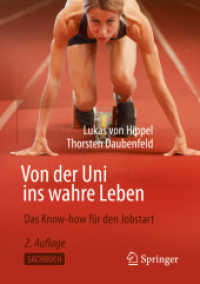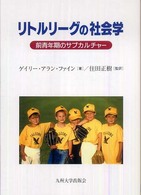- ホーム
- > 洋書
- > 英文書
- > Politics / International Relations
Full Description
'Lindy Edwards powerfully shows how politics can be understood as a passionate confrontation of ideas and ideologies. This book gives us a new and compelling way to think about the past, present, and future of Australian politics.' - Professor John Dryzek, Australian National UniversityBehind the evening news lies a world of political ideas and passionate conflict. The Passion of Politics unpacks the ideologies and theories that drive these political clashes, helping to explain why we admire some politicians and loathe others.The ideas driving today's politics all have roots in the political struggles of the past. They've been responses to great injustices and challenges, and they've underpinned enormous achievements. In Australia, they've helped create one of the most wealthy, free and just societies in history.Today we are faced with important choices between flawed options. The struggles of the past have undermined our belief in utopias. Yet the current battles remain crucial to defining our future. Understanding the dynamics of the ideas in play is essential to equipping ourselves to take part in these vital debates.
Contents
PrefaceAcknowledgementsIntroductionPART 1: THE FOUNDATIONS1 Values, beliefs and ideologies2 Conservatism3 Liberalisms4 SocialismPART 2: FORGING THE AUSTRALIAN TRADITION5 Australia at Federation and the radical democrats6 White Australia7 Early divisions and 'The three elevens'8 The birth of Australian egalitarianism9 Creating the two-party system10 Trends of political debate: Splits and creeping social democracyPART 3: 1970S CONSTRUCTIVISM AND LIBERATION MOVEMENTS11 Constructivism12 Feminism13 Gay rights movement14 Aboriginal rights movement15 MulticulturalismPART 4: A TURN TO THE RIGHT16 Neo-liberalism and rational choice theory17 1980s economic reforms18 Neo-conservatism19 A new nationalismPART5: OUR FUTURE CHOICES20 Lessons for the future21 Human nature22 How we organise ourselves23 Environmentalism as a window into future debatesConclusionSelected further readingNotesIndex








